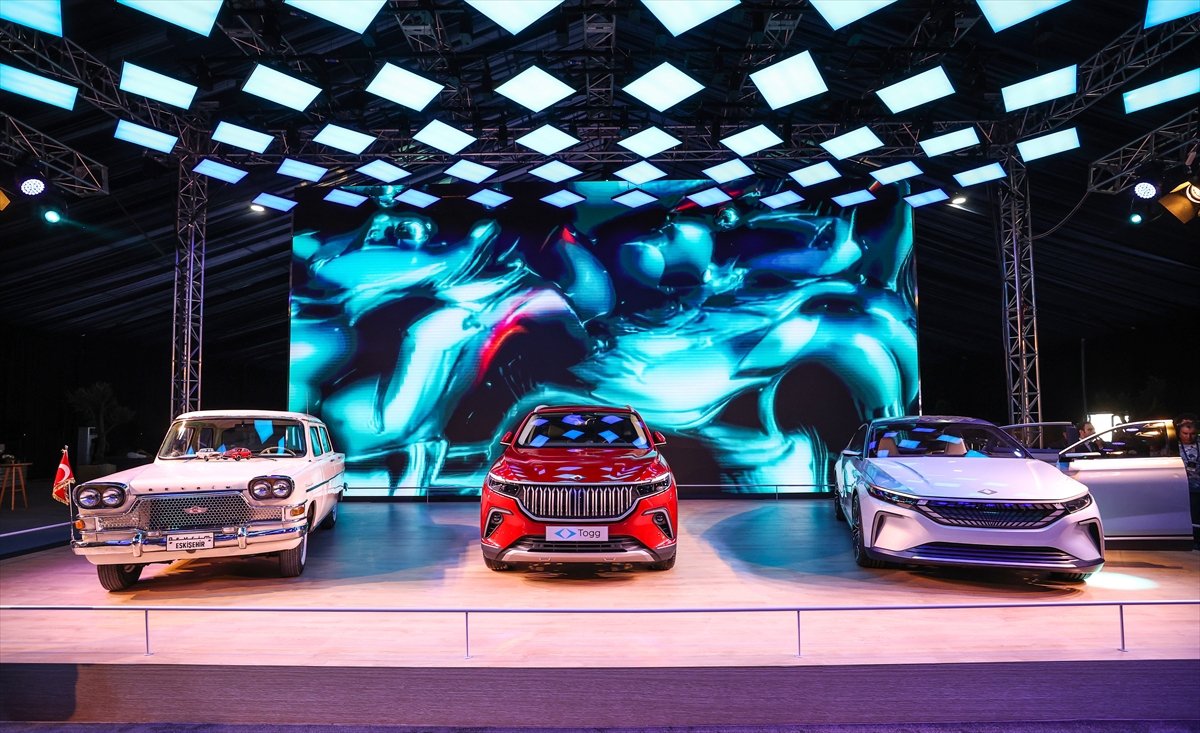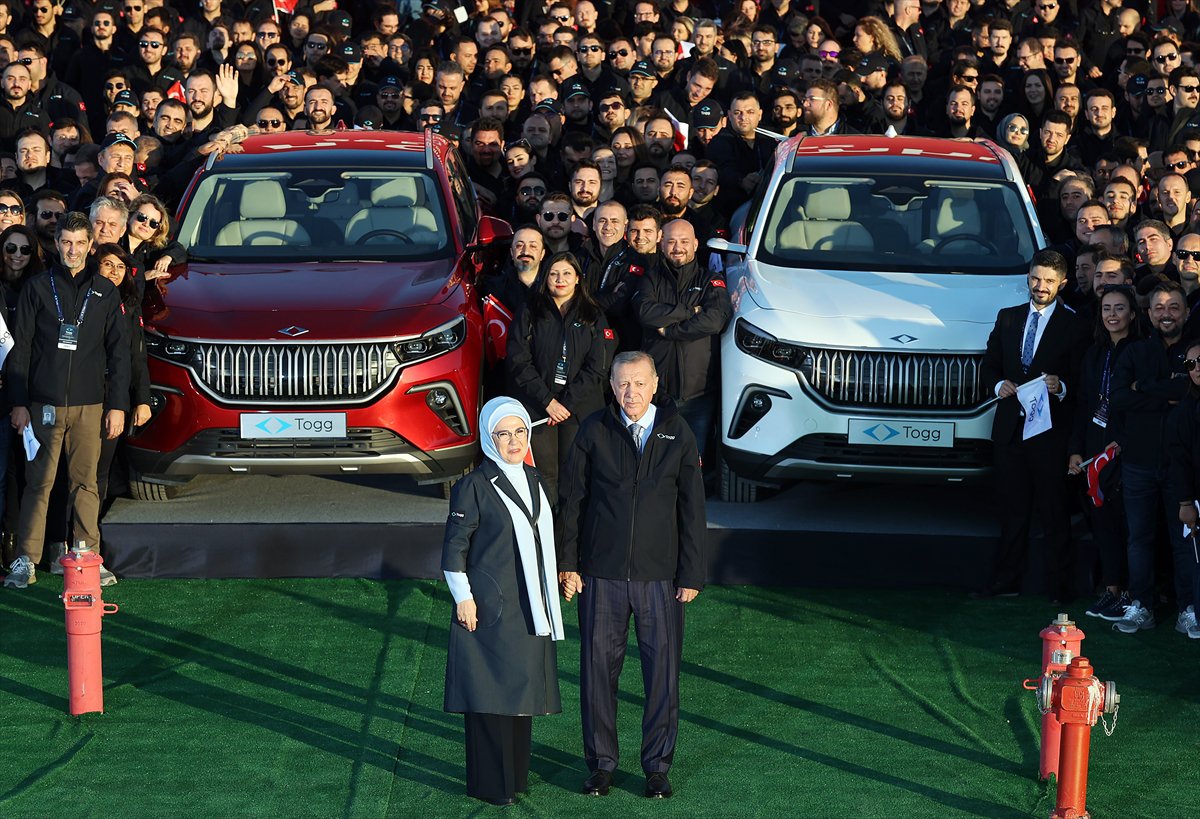President Erdoğan driving TOGG during the ceremony on the Republic Day. (Photos: AA)
With much celebration, President Recep Tayyip Erdoğan rolled out the country's first domestically produced electric car as Türkiye celebrated the 99th anniversary of Republic Day on October 29.
Speaking at the opening ceremony for the production facility of the electric car, Erdoğan said the TOGG is the "fulfillment of a 60-year-old dream." The project's design, battery, and recharging stations will prepare the country for the future, he said.
TOGG, with its first C-SUV model, is an embodiment of Türkiye's and its ruling party's recent trends of nationalism, high-prestige projects, state-business dependency, and continuing expansion efforts in the automotive manufacturing industry while simultaneously trying to boost Erdoğan's electoral prospects in the upcoming 2023 elections.
Türkiye as a car production hub
In recent years, Türkiye has become a production hub for automotive giants. Where the country's car industry in the 1960s and 1970s mainly existed out of import-substituting industrialization efforts, Türkiye seized its opportunity with the 1996 EU customs union agreement.
The automotive industry in the country goes back to the 1950s. The industry initially concentrated on creating tractors, with the first tractor plant, the Turk Tractor, going into operation in 1954.
Domestic automobile production only really started in the second half of the 1960s, but with inadequate capacity. After a failed effort by the state railways to commercially make a domestic car called 'Devrim' (revolution) in 1961, Ford Otosan commenced a similar attempt in 1966 and started producing a domestic car called "Anadol," the first mass-produced car of the country.
 "Devrim" (left) was showcased along with TOGG cars at the ceremony.
"Devrim" (left) was showcased along with TOGG cars at the ceremony.
In the 1980s, the Turkish car production strategy moved toward an export-oriented approach. With the 1996 customs union decision between the EU and Türkiye, the Turkish automotive industry emerged as a globally competitive industry. In recent decades, Türkiye's production capacity went from 300,000 in the 1990s to 1.3 million cars per year.
As the sector was injected with large quantities of (foreign) investment Türkiye was in 2017 the 15th largest motor vehicle producer in the world. In 2020, the automotive industry became the country's leading exporter, accounting for 18 percent of all exports. In 2021, "the locomotive of the Türkiye's economy" generated 29.3 billion dollars worth of exports 2021, according to the Uludag Automotive Industry Exporters' Association (OIB).
Unsuccessful attempts
Thus, while Türkiye's export-oriented car production flourished, indigenous cars never really came off the ground. This is where the new TOGG comes in, as it aims to build a successful domestic vehicle as well as transform Türkiye into a production hub for electric cars. The new domestic car, part of the many 2023 prestige projects, was already brought up by then Prime Minister Erdoğan in 2011. As electric cars offer new manufacturers new opportunities to join the established car manufacturing order.
The idea of producing a domestic automobile brand came to the fore in 2011 when Erdoğan called for it during a meeting with members of TÜSIAD, the Turkish Industry and Business Association, whose membership comprises mainly the large businesses that lead Turkish manufacturing. Erdoğan challenged the entrepreneurs, asking if there was not a brave fellow that would make a 100 percent indigenous car.
TÜSİAD's response was unenthusiastic, emphasizing the project's perceived infeasibility. However, TÜSİAD's rival organization, MÜSİAD, the Independent Industrialists and Businessmen Association, representing smaller companies and known to have lent support to AKP from its conception, backed the venture from the outset.
Against this background, in 2012, TÜBİTAK, the Scientific and Technological Research Council of Türkiye, launched a competition to create an indigenous Electric car with an award of 55 million dollars. The winning company, a firm owned by the Anadolu Group, a member of the present TOGG consortium—was chosen. Nevertheless, the project was terminated entirely without public explanation.
In 2014 TÜBİTAK tried once more, this time spending 45 million dollars, but the venture failed again. But in 2017, after numerous endeavors and repeated calls from Erdoğan, a consortium of five firms and an industry association were announced as the creators of TOGG. The consortium dedicated 2.75 billion dollars to the project, separate from the state incentives, worth an estimated 3.5 billion dollars.
In 2019, at a ceremony for TOGG, President Erdoğan conveyed his intent that TOGG would yield large benefits: "Türkiye is making its 60-year-old dream come true. For many years, we have said that Türkiye must produce its own automobile. We deserve better than just assembly... We are setting the rules of the game now."
Thus, after numerous attempts and sixty-two years after the first domestically designed Devrim sedan.
On October 29, marking the 99th anniversary of the Republic, the country finally inaugurated the factory of the new national car brand.

Foreign Dependency
Gürcan Karakaş, CEO of TOGG, stated that the production capacity will be 100,000 vehicles per year. With an initial focus on manufacturing 17,000-18,000 of the first model, the C-SUV, in 2023.
The production intends to gradually increase, with the aim to build at least 1 million electric cars in the upcoming years. Furthermore, at least two more TOGG models will be developed. To back the TOGG project, the president not only became the business's first client, but his administration also approved TOGG tax cuts, free land, low borrowing costs, and a state purchase guarantee of 30,000 cars a year till the end of 2035.
While TOGG is billed as Türkiye's first domestically manufactured electric car, the vehicle still largely depends on foreign companies for some of its essential parts. Although designed and assembled in Türkiye, batteries, and engines are imported. Currently, 51 percent of the materials are domestically produced. Minister of Industry Mustafa Varank, asserted he intends to increase this to 65 percent in coming years.
"The people's car"
Even though officials coin the car as the "people's car," the TOGG will likely be too expensive for many people in Türkiye. DW reported that there are plans to sell the first model at 900,000 lira (~50,000 Euro), unaffordable for many in the country, where the minimum wage is only 5,500 lira, less than 300 Euro. Also, more inexpensive TOGG models should be available in the upcoming years.
Meanwhile, Türkiye needs to step up its efforts to increase its currently limited network of EV charging stations. In order to combat this deficiency, TOGG announced a charging network under the name Trugo. Together with Shell, a total of 600 fast chargers will be installed at 400 filling stations.
These are considerable numbers but lag behind EU fast charge leader The Netherlands, with 3,500 fast chargers, while being nineteen times smaller than Türkiye. Furthermore, Türkiye is highly urbanized, problematizing the roll-out of public charging stations in dense residential areas. Most charging points are currently found in parking garages of shopping centers or at luxury hotels.
Together with the likely hefty price tag, the car will be too expensive for many Turks. This might prevent the car from becoming the 'people's car'.
After driving the first model, Erdoğan said, "They will say 'Crazy Turks' are coming'."
However, Europeans will have to wait for a while to get their hands on the TOGG as domestic sales of the first TOGG model will start at the end of the third quarter of 2023. After 15-18 months of domestic sales, "Türkiye's new pride" will be exported to Europe and the rest of the world. (WM/VK)







.jpg)
.jpg)
.jpg)
.jpg)
.jpg)